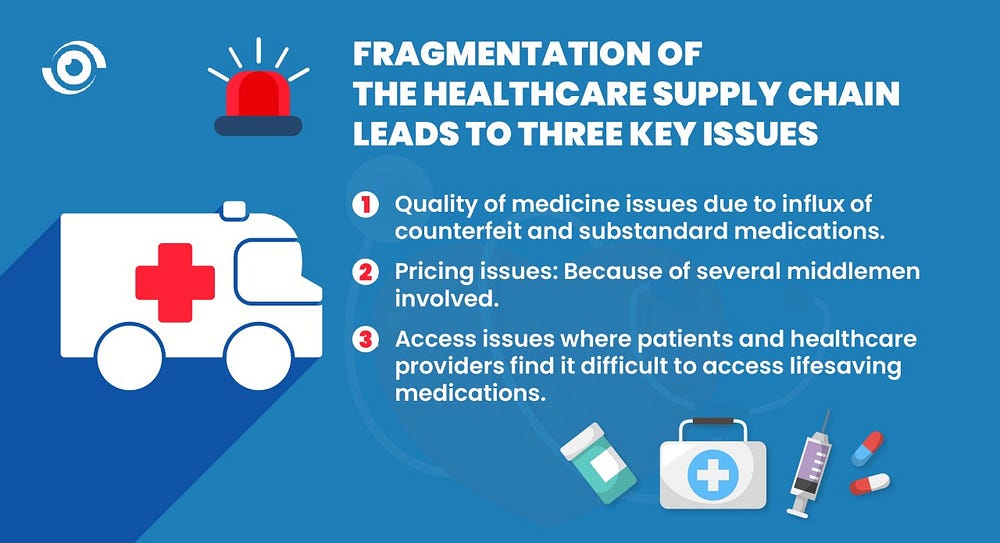Pharmaceutical procurement is a critical component of Nigeria’s healthcare system, affecting everything from the availability of essential medicines to the overall quality of healthcare services.
However, the current procurement landscape calls for revolutionizing pharmaceutical procurement in Nigeria to achieve efficiency and reliability.
This article explores how revolutionizing pharmaceutical procurement can transform Nigeria’s healthcare sector, ensuring better health outcomes and economic growth.
Current Challenges in Pharmaceutical Procurement

Photo Credit: Nigeria Health Watch
1. Substandard and Fake Drugs: One of the most pressing issues in Nigeria’s pharmaceutical procurement is the prevalence of substandard and counterfeit drugs. These fake medications not only fail to treat illnesses but can also cause severe health complications, leading to a loss of trust in the healthcare system.
According to the World Health Organization, one in ten medical products in low- and middle-income countries is substandard or falsified, and Nigeria is no exception.
2. Supply Chain Issues: Nigeria’s pharmaceutical supply chain is riddled with inefficiencies. These include corruption, lack of transparency, and inadequate logistics infrastructure. Corruption at various stages of the supply chain can lead to the diversion of drugs, resulting in stockouts and shortages in hospitals and clinics.
Moreover, the logistical challenges of transporting drugs across vast and sometimes inaccessible regions further complicate procurement processes.
3. Regulatory Challenges: The regulatory environment in Nigeria poses significant hurdles for pharmaceutical procurement. Despite efforts by agencies like the National Agency for Food and Drug Administration and Control (NAFDAC), the regulatory framework is often undermined by inadequate enforcement and limited resources.
This makes it difficult to ensure the consistent quality and safety of pharmaceuticals entering the market.
4. Economic Factors Economic constraints also play a critical role in hindering effective pharmaceutical procurement. Limited funding and budgetary allocations for healthcare mean that procurement processes are often underfunded.
This results in insufficient quantities of drugs being purchased, further exacerbating shortages and limiting access to essential medicines.
The Need for a Revolution
Poor procurement practices have a direct impact on public health. When patients cannot access necessary medications or receive counterfeit drugs, their health outcomes suffer. This can lead to increased morbidity and mortality rates, placing a heavy burden on the healthcare system.
Inefficient procurement practices lead to significant financial losses. Wastage due to expired or improperly stored drugs, combined with the costs associated with treating complications from counterfeit medications, strain the healthcare budget.
Nigeria can achieve substantial cost savings and allocate resources more effectively by improving procurement practices.
Pharmaceutical Procurement Technological Gap in Nigeria

The lack of modern technology in Nigeria’s pharmaceutical procurement system is a major barrier to efficiency and transparency. Many procurement processes are still manual, leading to errors, delays, and a lack of accountability. Embracing digital solutions is essential for creating a more robust and transparent procurement system.
A digital procurement platform like OGApharmacy Marketplace can significantly enhance transparency and efficiency. E-procurement platforms enable real-time tracking of orders, reduce paperwork, and minimize the risk of purchasing counterfeit pharma products.
These systems ensure accountability and streamline the procurement process by providing a clear audit trail.
Solutions To Mitigate Against The Challenges Of Procuring Quality Pharma Products
1. Inventory Management Systems: Implementing advanced inventory management systems that also verify the authenticity of quality medications helps reduced fake medication circulation, track stock levels in real time, forecast demand accurately, and avoid shortages or overstock situations.
OGApharmacy POS helps pharmacy businesses automate all the manual processes in their store while they focus their valuable time attending to patients needs and giving them the best experience.
2. Online Procurement Platforms:
E-procurement platforms like OGApharmacy Marketplace enable pharmacies and hospitals to connect with verified suppliers, streamlining the purchasing process and ensuring a wider selection of quality products at affordable prices.
3. Public-Private Partnerships
Public-private partnerships are crucial for leveraging resources and expertise. By collaborating with private sector entities, the government can benefit from technological innovations and best practices in procurement. These partnerships can also help bridge funding gaps and ensure a steady supply of essential medicines.
4. Policy Reforms
Enhancing the regulatory framework is essential for improving procurement practices. This includes stricter enforcement of existing regulations, as well as the development of new policies to address emerging challenges.
Strengthening NAFDAC’s capacity and resources will be crucial for ensuring the safety and quality of pharmaceuticals.
Potential Benefits and Impact

a. Improved Health Outcomes: Revolutionizing pharmaceutical procurement can lead to better health outcomes by ensuring the availability of high-quality medications. This, in turn, can reduce morbidity and mortality rates, improve patient satisfaction, and enhance overall public health.
b. Economic Growth Effective procurement practices can drive economic growth by reducing wastage, optimizing resource allocation, and fostering innovation. The resulting cost savings can be reinvested in other areas of the healthcare system, further enhancing its capacity and resilience.
c. Enhanced Trust Building a transparent and reliable procurement system can restore trust in Nigeria’s healthcare sector. Patients and healthcare providers will have greater confidence in the quality and availability of medications, leading to increased utilization of healthcare services.
d. Global Positioning By adopting innovative procurement strategies, Nigeria can position itself as a leader in healthcare solutions. This can attract investment, foster international collaborations, and enhance the country’s reputation on the global stage.
Conclusion
Modern pharmaceutical procurement system in Nigeria is not just a necessity but an opportunity to transform the healthcare system. By revolutionizing pharmaceutical procurement in Nigeria, embracing innovative solutions, and engaging all stakeholders, Nigeria can ensure the availability of high-quality medications, improve health outcomes, and drive economic growth.
The future of pharmaceutical procurement with OGApharmacy in Nigeria holds immense potential, and it is time to take actionable steps towards realizing this vision.